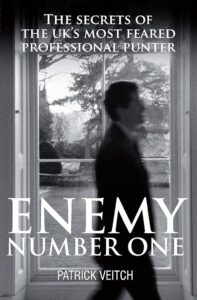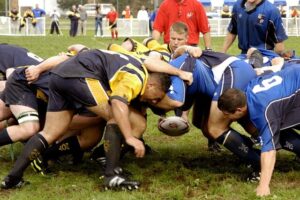 I’ve been reading a few professional gambler books.
I’ve been reading a few professional gambler books.
Patrick Veitch’s Enemy Number One: The Secrets Of The UK’s Most Feared Professional Punter, had been sitting on the book shelf since 2009. I wish I’d started reading sooner.
Published by the Racing Post.
A forward by John Francome set this up a treat.
The book come in 3 parts:
1) Early Days And troubled Times
2) Professional Punter And Owner
3) On The Inside
Including glossary and index we have 249 to detail the story trials and tribulation (and many successes) of a professional gambler of professional gamblers.
I’m not going to give all the juicy bits here as you won’t appreciate the book if I say too much. However, after reading Dave Nevison’s A Bloody Good Winner & Harry Findlay’s: Gambling For Life, it is up to speed. It’s well written and covers his story with some breadth so you get a feel for the man, his gambling successes, strength and weakness.
If you want the story of an accomplished gambler who is professional in all aspects of life then you will appreciate him over the ability of Findlay and Nevison. I respect both but from a true gambling stance Veitch comes across as more disciplined.
There’s a story to be told from a personal and gambling point of view.
In fact, Mr. Veitch had plenty of reasons to feel stressed out about life. He put his life on the line – like most professional gamblers – from an academic point of view and betting more money than most could comprehend.
All in all it was a good read. I did get the feeling that the winners never stopped but perhaps that’s the truth of the matter.
I would say that of all the modern-day professional punters Veitch is the most respected, accomplished and feared.
I guess the only way you will know is by buying this book and having a good read.
It will be exactly that.
 Milton Harris, who, since 2018, has been based in Sutton Veny, near Warminster, Wiltshire, was first granted a training licence by the British Horseracing Authority (BHA) in 2001. However, in the last decade and a half, Harris, 64, has had what might be politely described as an ‘interesting’ relationship with the governing body. The BHA first objected to Harris holding a training licence in late 2009, on the grounds that he was ‘not a fit and proper person’ to do so. Nevertheless, he continued to train under a temporary licence, with conditions, in 2010 and 2011 but, in December 2011, was made subject of a five-year bankruptcy restrictions order.
Milton Harris, who, since 2018, has been based in Sutton Veny, near Warminster, Wiltshire, was first granted a training licence by the British Horseracing Authority (BHA) in 2001. However, in the last decade and a half, Harris, 64, has had what might be politely described as an ‘interesting’ relationship with the governing body. The BHA first objected to Harris holding a training licence in late 2009, on the grounds that he was ‘not a fit and proper person’ to do so. Nevertheless, he continued to train under a temporary licence, with conditions, in 2010 and 2011 but, in December 2011, was made subject of a five-year bankruptcy restrictions order.
Reflecting on his bankruptcy, Harris said later, ‘Things had gone wrong with personal and financial relationships and I’d got myself in a few scrapes.’ Whatever the reasons, it was not until 2018 that the licensing committee relented and, once again, granted him a training licence. By his own admission, Harris resumed his training career with just eight horses and just two members of staff but, nonetheless, saddled a career-best 56 winners in 2021/22 and was just one shy of the number in 2022/23.
In the 2023/24 season, so far, he has saddled 33 winners and accrued just over £373,000 in prize money, placing him six in the National Hunt Trainers’ Championship. However, he is unlikely to be adding to that total any time soon because, on November 11, 2023, his training licence was suspended, with immediate effect, by the BHA. Any issue only came to light on November 9, 2023, when two of Harris’ intended runners at Ludlow, Balboa and Giddyupadingdong, were withdrawn, having been deemed, rather mysteriously, as ‘not qualified’ by the BHA. Harris is required to attend a licensing committee meeting in January 2024, to face accusations of ‘a breach of the conditions on his licence and related matters’.
 Introduction
Introduction
Ronnie O’Sullivan – Sporting Legends is a jackpot slot game by Playtech that has five reels and 25 paylines. The game offers several bonus features, including a Pick Me feature where players can win in just five rounds, and the 147 Maximum Break Free Games feature that gives players 12 free spins with a 1x multiplier on each spin.
The game is part of a series, which means there are daily, weekly, and mega jackpots up for grabs.
Ronnie O Sullivan Sporting Legends Bonus Features
If the logo appears on both reels 1 and 5 simultaneously, it will trigger the Championship Bonus feature. This feature presents you with a set of snooker balls, and you must choose one of them. If you pick correctly, the amount you’ve won will be displayed, and you can progress to the next stage of the tournament, represented by Ronnie in five different poses, symbolizing a different stage of the competition.
You can keep picking and progressing through the rounds of the Championship until you either win or reveal a “Collect” ball, which will end the feature. However, there are more “Collect” balls than win balls in the final round, making it harder to win.
Any significant win results in a cascade of gold coins, adding to the enjoyment. Click “Continue” to go back to the main game. Scatters award bonuses in addition to the line win, and they can appear anywhere on the reels, allowing you to win multiple scatter bonuses in one game.
Conclusion
Ronnie O’Sullivan – Sporting Legends is a feature-packed jackpot slot game by Playtech that offers several bonus features and the chance to win daily, weekly, and mega jackpots. The game is based on snooker legend Ronnie O’Sullivan and offers players the chance to become legendary stars while earning some extra riches.
 Sir Gareth Edwards, knighted in the Queen’s Birthday Honours List in 2015 for services to sport and charity, was arguably the greatest scrum-half in the history of rugby union. Born on July 12, 1947, in the former mining village of Gwaun-Cae-Gurwen, near Ammanford, in South West Wales, Edwards made his international debut, at the age of 19, in a Five Nations Championship match against France at the Stade Olympique Yves-du-Manoir, near Paris in 1967. The following season, at the age of 20, he became the youngest ever captain of the Welsh national team, against Scotland at Cardiff Arms Park in the same competition.
Sir Gareth Edwards, knighted in the Queen’s Birthday Honours List in 2015 for services to sport and charity, was arguably the greatest scrum-half in the history of rugby union. Born on July 12, 1947, in the former mining village of Gwaun-Cae-Gurwen, near Ammanford, in South West Wales, Edwards made his international debut, at the age of 19, in a Five Nations Championship match against France at the Stade Olympique Yves-du-Manoir, near Paris in 1967. The following season, at the age of 20, he became the youngest ever captain of the Welsh national team, against Scotland at Cardiff Arms Park in the same competition.
All told, as arguably the best player in a back division that included John Peter Rhys ‘JPR’ Williams, Gerald Davies, Phil Bennett and Barry John, Edwards would win 53 consecutive caps for Wales. Remarkably, for a scrum-half, he scored twenty tries for Wales in Test matches. He also won ten caps for the British Lions, notably in New Zealand in 1971, when they lost only one game and won a Test series against New Zealand and South Africa in 1974, when they were undefeated for the entire tour.
Edwards also scored what has been described as the ‘greatest try ever’ when playing for the Barbarians against New Zealand at Cardiff Arms Park in January, 1973. In the first few minutes of the match, Barbarians’ fly-half Phil Bennett retrieved a kick from New Zealand winger Bryan Williams inside his own 22-metre line, sidestepped three opponents and passed to full-back JPR Williams. Twenty-five seconds later, Edwards capped a sensational handling move by diving over in the corner, leading commentator Cliff Morgan to exclaim, ‘A dramatic start! What a score!’
